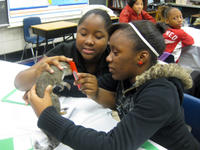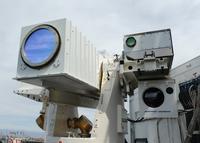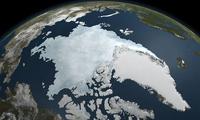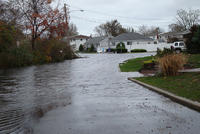-
Some geo-engineering approaches to combat climate change may not work
Numerous geo-engineering schemes have been suggested as possible ways to reduce levels of the greenhouse gas carbon dioxide in the atmosphere and so reduce the risk of global warming and climate change; one such technology involves dispersing large quantities of iron salts in the oceans to fertilize otherwise barren parts of the sea and trigger the growth of algal blooms and other photosynthesizing marine life; seeding the oceans with iron, however, may not address carbon emissions
-
-
Sandy relief bill says rebuilding effort should take into consideration climate-related risks
The $60 billion Sandy relief bill being debated this week in the Senate does not specifically mention the words climate change or global warming, but it implicitly raises topics and themes which are part of the climate change discussion; the bill says that federal, state, and local agencies engaged in the post-Sandy rebuilding effort should take into consideration “future extreme weather events, sea level rise and coastal flooding”
-
-
Innovative Atmospheric Vortex Engine for energy generation
A Canadian company offers a new energy generation concept: the Atmospheric Vortex Engine (AVE) uses low-temperature waste heat to create a tornado-like atmospheric vortex; in contrast with a real tornado, the vortex cannot go anywhere because it is anchored to its heat source. So it is really more like a dust devil or waterspout, and it serves as a low-cost virtual chimney
-
-
Fuels, household chemicals made from sugar
Scientists at the University of Manchester have identified a biocatalyst which could produce chemicals found in ice-cream and household items such as soap and shampoo — possibly leading to the long-term replacement of chemicals derived from fossil fuels
-
-
Encouraging science research, study among minorities

A study published last year, in which 83,000 grant applications from 2000 through 2006 were examined, found that African American scientists were far less likely therethan white scientists to obtain research money from the National Institute of Health (NIH); NIH is setting up a program to change that
-
-
Connection between goth subculture, mass shootings appears tenuous

Classmates of the otherwise bland and elusive Adam Lanza, who last Friday killed twenty children and six adults at the Sandy Hook school in Newton, Connecticut, described him as “goth”; is there a “goth” connection in the Newtown school shooting? The question is asked because news reports have connected several perpetrators of both mass shooting and killing on a smaller scale to goth culture; a closer examination shows that the relationship between goth and mass shooting is tenuous
-
-
NRA shuts down Facebook page in wake of Connecticut shooting
In the immediate aftermath of the Newtown shooting, the National Rifle Association (NRA) has deactivated its Facebook page, just one week after celebrating the fact that it has gathered 1.7 million “likes” on the page; the debate about whether the United States needs stricter gun controls continues, though
-
-
New, quick way to ID people exposed to dirty bomb, radioactive radiation
Research conducted by scientists from the Berkeley Lab could lead to a blood test that detects if a person has been exposed to radiation, measures their dose, and separates people suffering from inflammation injuries — all in a matter of hours
-
-
Deployable RF data backbone which matches fiber optic capacity
DARPA envisions 100-Gigabit per second RF communications link between airborne and ground assets; the goal is for the data link to achieve a range greater than 200 kilometers between airborne assets and a range greater than 100 kilometers between an airborne asset (at 60,000 feet) and the ground
-
-
EPA issues new soot pollution standard over industry’s objections
The Environmental Protection Agency (EPA), acting under court order, on Friday issued a new standard for soot pollution; the agency estimates the cost of complying to be between $53 million and $350 million – and the estimated benefits to be between $4 billion and $9 billion; utilities, manufacturers, chemical companies, and the oil and gas industry asked for a delay in issuing the rule, arguing it would be costly to implement
-
-
To keep global average temperature from rising above 2°C, action should be taken by 2020
Limiting climate change to target levels will become much more difficult to achieve, and more expensive, if action is not taken soon, according to a new analysis; a new study explores technological, policy, and social changes that would need to take place in the near term in order to keep global average temperature from rising above 2°C, a target supported by more than 190 countries as a global limit to avoid dangerous climate change
-
-
New view of meteorite impact
High-speed video of projectiles slamming into a bed of disks has given scientists a new microscopic picture of the way a meteorite or missile transfers the energy of its impact to sand and dirt grains; the research may change the way scientists model meteorite and missile impacts and their effects
-
-
U.S. Navy scientists honored for significant portfolio of newly patented discoveries and inventions

U.S. Navy scientists and engineers in 2012 once again had the world’s most significant government portfolio of newly patented discoveries and inventions, according to a November report published by the Institute of Electrical & Electronics Engineers (IEEE)
-
-
Top U.S., Canadian officials meet to discuss quickening pace of Arctic changes

One manifestation of global warming is the accelerating pace of Arctic ice-cap melting; the U.S. Navy Arctic Roadmap, authored by the Navy’s Task Force Climate Change, notes that, “Because the Arctic is primarily a maritime environment, the Navy must consider the changing Arctic in developing future policy, strategy, force structure and investment”; top U.S. and Canadian officials meet to discuss the implications of the rapidly melting arctic ice
-
-
Sandy exposes weaknesses of antiquated sewage systems in N.Y., N.J.

Hurricane Sandy destroyed homes, apartments, and entire communities, and it also exposed the outdated sewage systems in New York and New Jersey; since Hurricane Sandy, millions of gallons of raw sewage have infiltrated waterways in both states, and it could take several years and billions of dollars to fix the systems; New York governor Andrew Cuomo estimated that it will cost about $1.1 billion to repair treatment plants; officials in the field say that much more will have to be done
-
More headlines
The long view
Encryption Breakthrough Lays Groundwork for Privacy-Preserving AI Models
In an era where data privacy concerns loom large, a new approach in artificial intelligence (AI) could reshape how sensitive information is processed. New AI framework enables secure neural network computation without sacrificing accuracy.
AI-Controlled Fighter Jets May Be Closer Than We Think — and Would Change the Face of Warfare
Could we be on the verge of an era where fighter jets take flight without pilots – and are controlled by artificial intelligence (AI)? US R Adm Michael Donnelly recently said that an upcoming combat jet could be the navy’s last one with a pilot in the cockpit.
The Potential Impact of Seabed Mining on Critical Mineral Supply Chains and Global Geopolitics
The potential emergence of a seabed mining industry has important ramifications for the diversification of critical mineral supply chains, revenues for developing nations with substantial terrestrial mining sectors, and global geopolitics.
AI and the Future of the U.S. Electric Grid
Despite its age, the U.S. electric grid remains one of the great workhorses of modern life. Whether it can maintain that performance over the next few years may determine how well the U.S. competes in an AI-driven world.
Using Liquid Air for Grid-Scale Energy Storage
New research finds liquid air energy storage could be the lowest-cost option for ensuring a continuous power supply on a future grid dominated by carbon-free but intermittent sources of electricity.
Enhanced Geothermal Systems: A Promising Source of Round-the-Clock Energy
With its capacity to provide 24/7 power, many are warming up to the prospect of geothermal energy. Scientists are currently working to advance human-made reservoirs in Earth’s deep subsurface to stimulate the activity that exists within natural geothermal systems.
